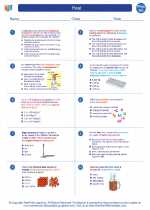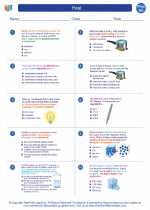Heat -> acceleration
Acceleration
Acceleration is a vector quantity that describes the rate of change of an object's velocity. It can be thought of as how quickly the velocity of an object is changing, either in terms of speed or direction.
Calculating Acceleration
The formula for calculating acceleration is:
a = (vf - vi) / t
where:
Units of Acceleration
The SI unit of acceleration is meters per second squared (m/s2). This unit represents how much the velocity of an object changes in one second. Other units of acceleration include km/h2 and cm/s2.
Types of Acceleration
There are several types of acceleration, including:
- Linear Acceleration: This is the acceleration of an object moving in a straight line.
- Angular Acceleration: This is the acceleration of an object moving in a circular path.
- Centripetal Acceleration: This is the acceleration directed towards the center of a circular path.
Study Guide
When studying acceleration, it's important to understand the following key concepts:
- Understanding the difference between velocity and acceleration.
- Knowing how to calculate acceleration using the formula a = (vf - vi) / t.
- Recognizing the units of acceleration and how to convert between different units.
- Understanding the different types of acceleration and their applications in real-world scenarios.
Additionally, practice problems and real-world examples can help reinforce your understanding of acceleration and its applications in physics.
Remember to also familiarize yourself with the concept of negative acceleration, which is commonly referred to as deceleration or retardation.
By mastering the concept of acceleration, you'll be better equipped to analyze and solve problems involving motion and dynamics in physics.



